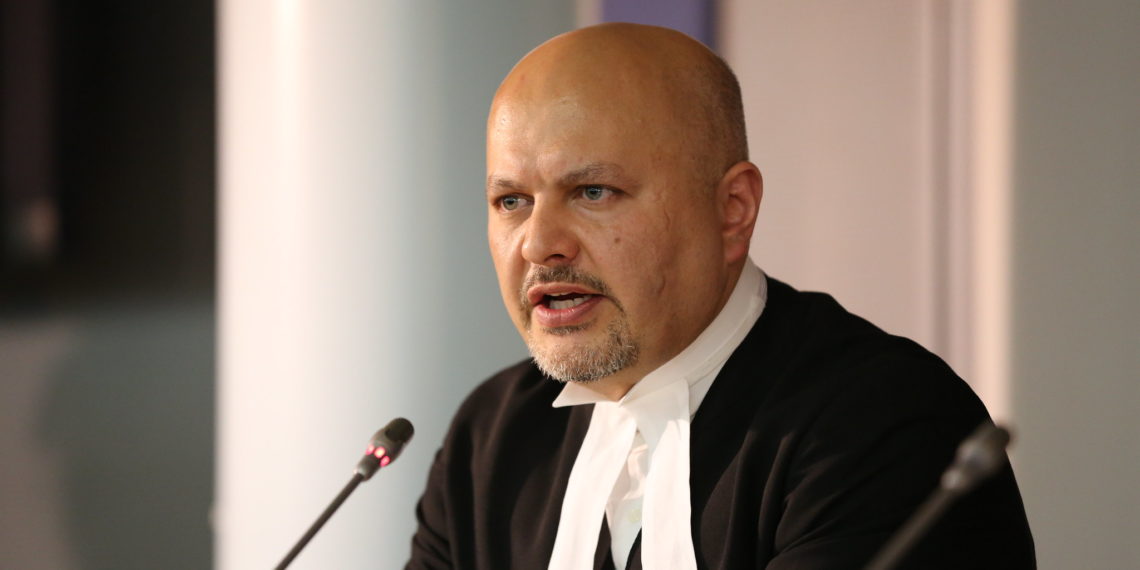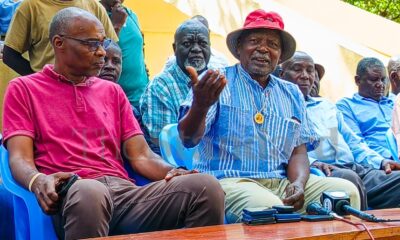Politics
The Hurdles Ruto’s Lawyer Khan Is Facing From Being The Next ICC Prosecutor Despite Being Front Runner

British barrister Karim Khan’s comeback as a frontrunner in the race to succeed the outgoing Prosecutor of the International Criminal Court has revived the opposition that kept him out of the initial shortlist of four finalists last year.
Khan, seen as a divisive figure within the civil society groups involved with the ICC, was one of 14 finalists the expert selection committee interviewed for the prosecutor’s position and subjected to vetting but was a shock omission from the July 2020 shortlist. Two lawyers, who had represented victims in the incomplete crimes against humanity case against Uhuru Kenyatta at the ICC before he was elected Kenya’s President, were on the shortlist, as was Canadian prosecutor and Ugandan judge. Kenya was the first state to object to the shortlisted candidates, citing lack of managerial experience.
Khan, too, had represented Kenyatta’s co-accused, Head of Public Service Francis Muthaura, before his case was terminated because of prosecution witnesses withdrew their testimony. He thereafter joined the defence of Kenyan deputy president William Ruto, whose case would be terminated in April 2016 for what one of the judges termed as “intolerable levels of witness tampering”.
Such is Khan’s international influence and gravitas that the Bureau of the Assembly of States Parties reopened the shortlist for prosecutor after the first four had been subjected to public interviews by states in August. The new shortlist included another five lawyers. Khan’s among them.
Ultimately, the race has come down to two frontrunners – Khan and Irish lawyer Fergal Gaynor, who headed the selection committee’s shortlist. Khan, who has roots in Pakistan, is a highly regarded Queen’s Counsel in Britain, and currently Assistant Secretary-General of the United Nations serving as the Special Adviser and Head of the UN Investigative Team for the Promotion of Accountability for Crimes Committed by Da’esh/ISIL in Iraq. Gaynor, a Malawi-born Irish lawyer, is Reserve International Co-Prosecutor at the Extraordinary Chambers in the Courts of Cambodia and a Judge in the Kosovo Specialist Chambers.
The 123 states parties to the Rome Statute, the founding treaty of the International Criminal Court, have been unable to agree on the third ICC prosecutor to replace Ms Fatou Bensouda, who retires in June after the completion of her nine-year term. She succeeded the first prosecutor, Luis Moreno Ocampo, whom she had deputized for five years. As the Assembly of States Parties resumes its sittings in New York on February 8, the election of the prosecutor will be the big unfinished business from last year.
Although civil society organisations do not have casting votes in the election of the prosecutor, their lobbying and advocacy can shape perceptions about candidates and influence how states vote. Six mostly Francophone civil society organisations endorsed Khan’s candidacy in a January 8 open letter. “With a proven track record of experience and success, who has demonstrated the capacity to implement the recommendations of the IER and effectively lead the Office of the Prosecutor during these next critical years is, in our view, Karim Khan,” said the letter of support signed by Club des Amis du Droit du Congo (Democratic Republic of Congo); Ligue pour la Paix, les Droits de l’Homme et la Justice (DRC); Bureau d’Ètudes et de Réflexions pour le bien-être des Communautés (DRC); Human Rights Defenders Coalition (Malawi), Centre Marocain pour la Paix et la Loi (Morocco); and Association Burkinabe pour la Paix et les Droits Humains (Burkina Faso).
Another eight civil society organisations engaged in ICC-related work have questioned Khan’s general conduct when he represented Ruto at the ICC. The case was terminated for lack of evidence after the prosecution was unable to use the testimonies of witnesses who had recanted or withdrawn. The ICC commenced three Article 70 proceedings in respect of the Ruto case. One suspect has surrendered to the court and been released provisionally before trial.
The Anglophone civil society organisations point out Khan’s actions after the death of a key defence witness, Meshack Yebei, who went missing from his home in Turbo, Uasin Gishu, on December 14, 2014 before his mutilated body was found in a game park 400 kilometres away.
“When the mutilated and tortured body of Mr Yebei was indeed found in March 2015, Mr Khan remained silent on the matter and appeared to have dropped his public demands for an investigation. Mr Yebei’s family has asked why Mr Khan did not raise the alarm when Mr Yebei first disappeared, but only spoke when his body had been found, given that he was a critical defence witness,” read the statement.
The organisations opposed to Khan’s candidacy include the Africa Centre for Open Governance (Kenya); the Uganda-based African Defenders (Pan-African Human Rights Defenders Network),; Tanzania’s Centre for Strategic Litigation, the Kenya Human Rights Commission (KHRC); The Kenyan Section of the International Commission of Jurists (ICJ-Kenya); Kenya National Victims and Survivors’ Network; the Arusha-based Pan African Lawyers Union (PALU),; and Trust Africa, in Dakar, Senegal.
Yebei reportedly chose to leave the defence team after receiving death threats. Kenya’s then Director of Public Prosecutions, Keriako Tobiko, ordered an investigation into his death, but no suspects have been arrested or charged.
“To date, Mr Khan has not spoken publicly about the need for the Kenyan government to carry out an investigation into the death of Mr Yebei, his witness, despite the former ICC Registrar’s expression of willingness to assist the Kenyan authorities with its investigations regarding Mr Yebei’s death,” the NGO letter says.
In an exclusive letter to Journalists For Justice, Khan said he took all the necessary measures to ensure Yebei was safe, including referring him to the to the ICC-Victim and Witness Unit (ICC-VWU) — the organ within the ICC registry tasked with providing protective measures, security, counselling and assistance to witnesses.
“I am not able to disclose the source of alleged threats against Mr Yebei that grounded my request for his protection, save to say I did everything ethically within my power to ensure Mr Yebei and his family were safe. The responsibility to physically protect, relocate or support witnesses does not fall upon an individual counsel under the Rome Statute regime. Rather, it falls on the independent ICC-VWU once a witness is referred or issues highlighted to them by counsel or other persons,’’ he said.
When Yebei’s body was discovered, Khan indicated that he wrote to Kenyan authorities to investigate his death but investigators leaked his correspondence to the Press. Khan says he wrote to the DCI requesting an inquiry. It is not clear if the incident was investigated.
Khan eventually stopped contacting the DCI for updates regarding the investigations about Yebei’s death and relied on the ICC Victims and Witnesses Unit. VWU was in close contact with the authorities in Kenya and regularly updated Khan on progress. Khan confirmed that he and his team remained in contact with Yebei’s family to offer them emotional support after the tragic loss.
The eight civil society organisations have also called out Khan for his frequent outbursts against those he perceived to be against Deputy President William Ruto. In a local television interview, Khan even suggested that the cases were attempts by the ICC to remove Ruto from power. “They thought that Kenyans were so weak that by saying that choices have consequences they would get a different set of leaders that were amenable to outside interests. Kenyans were not naïve. They made the right decision and the court process, fortunately after a lot of work by the defence teams, after independent review by experienced judges… showed that the evidence was distinguished by gaping holes, contradictions, fallacies, and lies,” he said.
Kenya Insights allows guest blogging, if you want to be published on Kenya’s most authoritative and accurate blog, have an expose, news TIPS, story angles, human interest stories, drop us an email on [email protected] or via Telegram
-

 Business2 weeks ago
Business2 weeks agobetPawa Empire Crumbles: Mr Eazi’s Betting Gambit Unravels Amid Partner’s Shadowy Deals
-

 Business1 week ago
Business1 week agoMinnesota Fraud, Rice Saga, Medical Equipment Deal: Why BBS Mall Owner Abdiweli Hassan is Becoming The Face of Controversial Somali Businessman in Nairobi
-

 News1 week ago
News1 week agoDCI Probes Meridian Equator Hospital After Botched Procedure That Killed a Lawyer
-

 Politics1 week ago
Politics1 week agoYour Excellency! How Ida’s New Job Title From Ruto’s Envoy Job Is Likely to Impact Luo Politics Post Raila
-

 Investigations2 weeks ago
Investigations2 weeks agoEXPOSED: SHA Officials Approve Higher Payments for Family, Friends as Poor Patients Pay Out of Pocket
-

 News1 week ago
News1 week agoKenya Stares At Health Catastrophe As US Abandons WHO, Threatens Billions In Disease Fighting Programmes
-

 Politics2 weeks ago
Politics2 weeks agoJaramogi Clan Tells Raila Jr, Winnie Against Disrespecting Their Uncle Oburu, Warns of Curses
-

 Business2 weeks ago
Business2 weeks agoKRA Boss Humphrey Watanga In Big Trouble In Sh5.5 Billion Rice Import Scandal

















